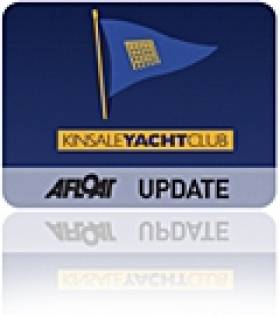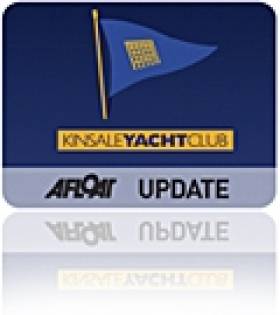Displaying items by tag: Ian Travers
Sovereigns Cup Aiming for 140 Entries
Entries are coming in at a good pace for The Sovereign's Cup the South coast sailing event takes place from 22nd-25th June 2011 in the outer harbour of Kinsale, Co Cork.
"We are delighted with the entry level to date and are now encouraging boats to enter The Sovereign's Cup on our website www.sovereignscup.com or by calling Kinsale Yacht Club directly on (021) 4773433. Already, skippers are beginning to plan their sailing events for the year and we hope that they will favourably consider us here in Kinsale," said Gary Horgan, Regatta Director.
"Additionally, this year, the Dun Laoghaire to Dingle race and ICRA Championships in Cork just before The Sovereign's Cup should act as good feeders as boats will be down south. As well as the excellent sailing conditions, race management and social programme ashore, there is a good discounted entry fee for the first 100 entries, which is already proving very attractive to entrants. Also, we are encouraging people to start thinking about their travel and accommodation plans and are delighted that the Cork Swansea ferry will enable more sailors to access Kinsale easily from the UK," he added.
The Sovereign's Cup was established in 1995 as and has been a very successful and hugely popular cruiser regatta. The biennial event attracts over 140 boats from all over Ireland and the UK who compete for the prestigious Sovereign's Cup for best all round score in IRC and The Portcullis Trophy for best progressive handicap.
There are many Classes for entry; including Class 0, 1, 2, 3, 4 and two White Sails classes. Also, the Quarter Ton Class Championships will be taking place during the Sovereign's Cup, bringing many new visitors to Kinsale from the South of England and Wales in particular.
According to Ian Travers of the Sovereign's Cup Committee at KYC, interest has been phenomenal and he has received plenty of calls from UK and Irish owners expressing their interest.
"Also, I have received confirmation that a quarter tonner named 'Black Fun' is to be shipped from New Zealand to Europe this year and is intent on making it to Kinsale for the Sovereign's Cup! We are confident that there will be around 25-30 quarter tonners participating in the Sovereign's Cup this year," said Ian Travers.
For more information on The Sovereign's Cup, contact Kinsale Yacht Club on (021) 4773433 www.kyc.ie or www.sovereignscup.com
Take a look back at Bob Bateman's photos from Sovereigns Cup 2003, Sovereigns Cup 2005 and Sovereigns Cup 2007 in our photo reviews
Click this link for all the lastest Sovereigns Cup news from Afloat.ie
Quarter Ton Class Returns to Sovereigns Cup
The Quarter ton fleet is sailing back to the Sovereigns Cup in 2011. The event runs in Kinsale from June 22-25th.
The Quarter ton fleet made its debut at the 2009 event where a total of seventeen boats competed for the 'Keane's Jewellers perpetual Quarter Ton trophy'. Boats travelled from all over Ireland for the event with seven boats making the journey from the UK.
The four-day regatta was sailed on windward leeward courses, with one coastal race along the beautiful West Cork coastline. The coastal race proved memorable as the fleet short tacked their way along the shore to gain tidal relief in twenty knots of breeze and blazing sunshine with the race culminating in a long planning run back towards the mouth of the harbour.
After eight races the Cowes based yachtsman Peter Morton on 'Anchor Challenge' won the event on count back from Rob Gray's beautifully presented 'Aquilla' which was testimony to the close racing experienced within the fleet. The Ron Holland prize for best production boat was awarded to Kinsales' Ian Travers on his Bolero 'Bandit'.
The inclusion of the class in the 2009 regatta developed a lot of interest both during and after the event. Since then the Irish Quarter ton fleet has developed with the addition of some new boats with others currently undergoing refit for next season. With the recent announcement by the Quarter ton class in the UK to yet again include this event on their calendar for next year, it is highly likely that even in these recessionary times, the class numbers will grow for this truly enjoyable event. (See www.quartertonclass.org )
If you are interested in bringing your quarter tonner to Sovereigns Cup 2011 please contact Ian Travers @ +35387 9481576 or [email protected] or see HERE for further details.






























































